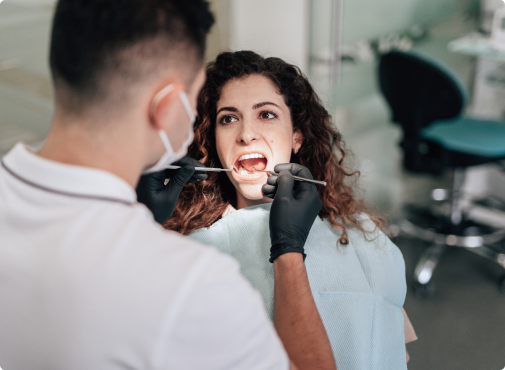Healthy gums, healthy life: Let us help you maintain your smile and overall health
Maintaining healthy gums is crucial for overall oral health and well-being. The gums provide a foundation for the teeth, and when they are infected with bacteria, it can lead to serious health problems such as cardiovascular disease, stroke, and diabetes. Gum disease, also known as periodontal (perry-o-DON-tal) disease, is a bacterial infection that can cause the gums and bone structures around the teeth to break down. This can result in tooth sensitivity, abscess and ultimately tooth loss.

At Eagle Family Smiles, our team of experienced general dentists offers gum disease treatment and screening to help patients maintain healthy gums. If you experience the above signs and symptoms, it may indicate the presence of gum disease, and prompt treatment is essential to prevent further damage to your oral health.
Without proper treatment, gum disease can progress and eventually lead to the loss of teeth, as well as the destruction of connective tissue and jawbone. In fact, it is the leading cause of tooth loss among adults in developed countries. Our modern dentistry services provided in Chester Springs offer nonsurgical procedures to help patients reestablish gum health and prevent the progression of periodontal disease.
If you are experiencing gum infections, bleeding gums, or other dental emergency, our team is here to help. Contact us today to schedule a visit with our dentists in Chester Springs, PA, and take the first step towards maintaining healthy gums and overall oral health.
The buildup of plaque on your teeth is the primary cause of gum disease, a common dental problem that affects millions of people worldwide. While poor oral hygiene is the leading cause of plaque buildup, other factors such as teeth grinding, tobacco use, hormonal changes, and poor nutrition can contribute to this condition. At Eagle Family Smiles, we offer comprehensive dental exams to determine the underlying cause of your bleeding gums.
While some factors contributing to gum disease may be beyond your control, our judgment-free dental office in Chester Springs, is committed to providing effective and accurate treatment to address your concerns. Some common symptoms include red, swollen, or sore gums, bleeding gums, receding gums, loose teeth, mouth sores, and bad breath. Changes in the fit of partial dentures may also indicate gum disease. So in case you are facing any such symptoms, don’t hesitate to contact us today to schedule an appointment.
Preventing gum disease requires proper oral hygiene at home and regular visits to a dental professional like Eagle Family Smiles. Our dental hygienists will perform professional cleanings to remove plaque and tartar buildup that can lead to gum disease.
During routine visits, we will screen for signs of gum disease and review your medical history to determine the root cause. Early detection and treatment of gum disease offer more effective results. We will also educate you on proper at-home oral hygiene to keep your teeth and gums healthy. We also recommend that you eat a healthy diet that limits sugary beverages and snacks. If you have any concerns about medication and gum health, we encourage you to discuss this with your general physician or doctor.
Periodontal or Gum disease is caused by the toxins in plaque that can spread to below the gum line. It can result in chronic inflammatory response that destroys bone and soft tissue. Symptoms may be absent, but deepening pockets between the gums and teeth indicate destruction. Gum disease can get worse if it’s left untreated.
Anyone can get gum disease, but there are other things that can raise your risk of getting it.
It is important to be aware of these risk factors and to take steps to prevent or manage them to reduce the risk of developing gum disease. Practicing good oral hygiene, maintaining a healthy diet, quitting smoking, and managing any underlying medical conditions can all help reduce the risk of gum disease.
Our dental team in Chester Springs checks for gum disease during a routine dental exam, which includes the following steps:
At Eagle Family Smiles, we offer several gum disease treatment options to our patients, depending on their symptoms. For patients with early signs of gum disease, a professional cleaning is recommended. Our dental team will also give advice for improving your daily oral hygiene.
A professional cleaning may not be enough if your gum disease is severe. Usually a special deep cleaning call scaling (SKAY-ling) and root planning (PLAY-ning) may be recommended, which involves removing plaque and tartar from infected gums.
Laser dentistry is an option for patients with advanced gum disease, as it targets diseased gum tissue with a sterile beam of laser energy.
To determine the best treatment option for you, we recommend visiting our family dental care office in Chester Springs, PA. Our team of experienced dentists will provide a worry-free exam and recommend the most effective treatment for your gum disease. Contact us today to schedule your appointment.
Plaque is a sticky film filled with bacteria that can cause your body to react and make your gums become red, puffy and swollen. Tartar is a hardened form of plaque that can only be removed by a dental hygienist using special tools. Tartar buildup can lead to severe complications with your oral health, so regular dental cleaning is recommended to avoid tarter buildup.
Our dentists will numb your gums to make sure the procedure does not hurt, but you may feel some tenderness and discomfort after treatment. We will provide instructions on how to manage this discomfort. The slight discomfort is far better than avoiding treatment and facing painful and costly consequences.